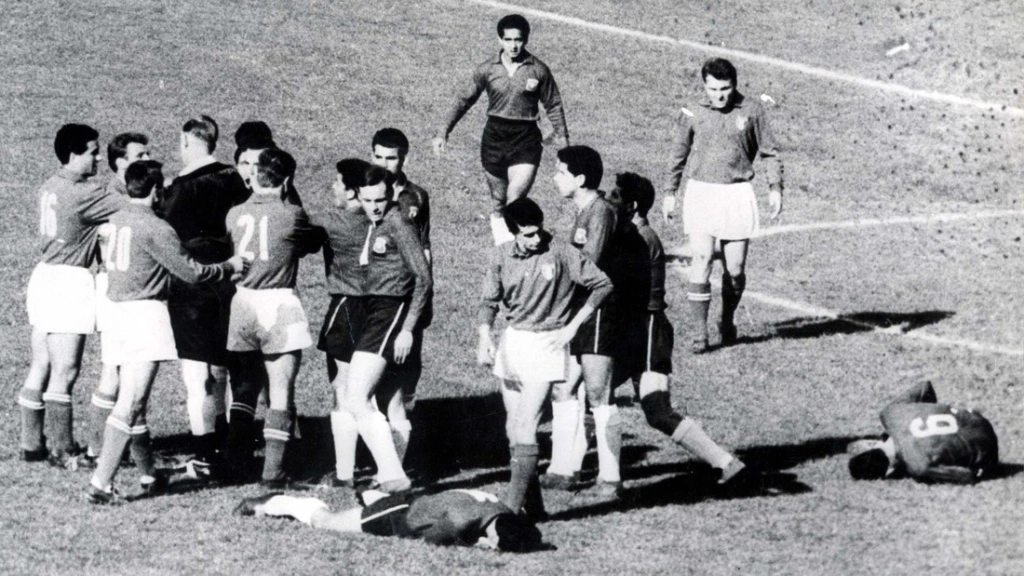In questionable taste, metaphors of war are frequently wheeled out to describe football matches. Spells of territorial dominance are termed as ‘sieges’ complete with ‘aerial bombardments’; midfield ‘generals’ command the play while well-paid foreign imports are regularly dismissed as ‘missionaries’. Few encounters, however, have so enduringly attracted militaristic comparison as the World Cup group stage clash between Italy and host-nation Chile in 1962, popularly referred to as the ‘Battle of Santiago’.
The context in which this grizzly affair took place has been repeatedly highlighted in the match’s many post-mortems. The opening exchanges of the tournament had produced a disturbing list of injuries, and the Azzurri’s earlier 0-0 draw with West Germany was condemned as ‘wrestling and warfare’ in subsequent reports.
Moreover, unfavourable descriptions of Chilean society by travelling Italian journalists had served to whip up animosity between the sides. La Nazione and Corriere Della Sera ran articles portraying the local population as prone to ‘malnutrition, illiteracy, alcoholism, poverty’ along with numerous references to rife prostitution. Chilean reporters hit back with claims of Italian drug-addiction fuelled by Inter’s recent doping scandal – though in truth, the selection of South American-born Oriundi in the Italy team had already rendered them highly unpopular in the continent.
Experienced English referee Ken Aston, who would later invent red and yellow cards, was the day’s unwilling protagonist. After just five minutes, he sent off Torino’s Giorgio Ferrini for kicking out after a spikey string of tackles in midfield. This set the tone for the match, as Aston chose largely to let Chilean offences pass, coming down more heavily on Italian retaliations. The incredulous Ferrini required a police escort to lead him from the field.
The second Italian sending off would come before half-time, as AC Milan defender Mario David was rightly given his marching orders for a flying kick aimed at Leonel Sanchez. Sanchez, though, had no right to be on the pitch at the time, having landed a nose-breaking left hook on Italy captain Humberto Maschio shortly before. Referee Aston was unsurprisingly castigated by the Italian press, but keeping a lid on such a tempestuous affair was an impossible task. His view of Sanchez’s punch was obscured by a separate scuffle, while the linesman (a holocaust survivor living in America, reportedly chosen more for his backstory than officiating ability) was perfectly placed but offered little help. In addition to the fighting was a great amount of play-acting on both sides, making Aston’s mistakes much more comprehensible than they were later made out to have been.
It took until the 73rd minute for the nine men of Italy to eventually concede, as Jaime Ramirez headed home a failed clearance from goalkeeper Carlo Mattrel. Jorge Toro added a long-range second late on, but the headlines had already been clinched by the relentless melee taking place between the players. A particularly vivid encapsulation of Aston’s unenviable task came between the two goals, as the Englishman jumped onto the floor to break up a Rugby-esque tussle in the centre circle.
In the final action of the game, Sandro Salvadore blocked off a Chilean attacker without a thought for the ball, and the resulting scrap continued after Aston had despairingly blown for full-time. He was talked out of attempting to intervene further, striding off the pitch with his assistant and a disgusted look on his face.
The loss entailed Italy’s exit from the tournament, but none of the subsequent reports focussed much attention on the result. The BBC’s David Coleman famously described the match as “the most stupid, appalling, disgusting and disgraceful exhibition of football in the history of the game” and “a disaster for the World Cup” as he introduced the highlights, expressing his hope that the two sides never met again.
More worrying was the response in Italy, where military protection was deemed necessary for the Chilean consulate in Rome. While not surpassing the severity of the ‘Battle of Santiago’, the 1962 tournament continued in a similar vein, with brawls erupting in both semi-finals.

